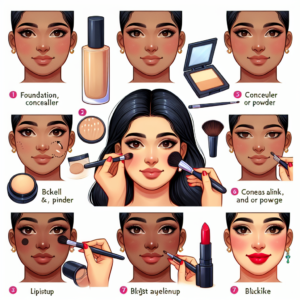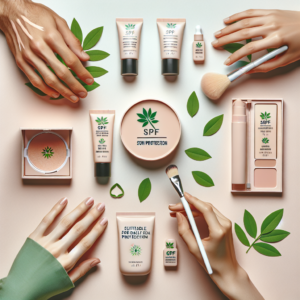
Key Takeaways
- Choose vegan SPF makeup that is hypoallergenic and non-comedogenic to avoid irritating acne-prone, sensitive skin.
- Look for ingredients like zinc oxide and titanium dioxide for physical sun protection that’s gentle on the skin.
- Opt for products with added skincare benefits such as salicylic acid or hyaluronic acid to treat and hydrate the skin.
- Apply makeup using clean tools and gentle techniques to reduce the risk of aggravating sensitive skin.
- Regularly reapply SPF makeup throughout the day to maintain effective sun protection.
| Category | Details |
|---|---|
| Product Recommendations | – Foundations: Oxygenetix Oxygenating Foundation, BareMinerals Complexion Rescue – Tinted Moisturizers: Smashbox Photo Finish Control Mattifying Primer – Concealers: Dermablend Quick-Fix Concealer |
| Ingredients to Embrace | – Zinc Oxide and Titanium Dioxide for sun protection – Salicylic Acid for blemish-fighting – Hyaluronic Acid for hydration – Aloe Vera for soothing and reducing inflammation |
| Ingredients to Avoid | – Artificial Fragrances and Dyes – Alcohol<br>- Parabens – Coconut Oil (comedogenic) |
| Application Tips | – Prep skin with a gentle cleanser and oil-free moisturizer – Apply sunscreen even if makeup has SPF – Use clean application tools – Apply products gently in thin layers – Blend foundation outward from the face center – Tap concealer to blend, avoid rubbing – Set makeup with mineral-based powder |
| Understanding SPF Ratings | – SPF 30 recommended for everyday use – Higher SPF needed for sensitive or fair skin, or extended outdoor exposure – Reapply every two hours, more often if sweating or swimming |
Discovering Vegan SPF Makeup for Sensitive, Acne-Prone Skin
When it comes to sensitive, acne-prone skin, every product you use can make a difference—either soothing your skin or sparking a breakout. This is why finding the right makeup is like striking gold. Vegan SPF makeup can be that treasure, offering protection from the sun’s harmful rays without the irritation that can come from harsh chemicals.
The Importance of Hypoallergenic Formulas
Now, let’s get down to the nitty-gritty. If your skin could talk, it would ask for makeup that doesn’t cause a fuss. That’s what hypoallergenic formulas do best. They’re crafted to be as gentle as a whisper, reducing the risk of allergic reactions and irritation. For those of us with skin that’s more delicate than a house of cards, this is crucial.
Why hypoallergenic, you ask? Well, because your skin is unique and can be reactive. Hypoallergenic products are formulated to be kinder to your skin, minimizing the chance of redness, itching, or worse—breakouts. This means they typically avoid common irritants like fragrances, parabens, and synthetic dyes. Think of them as your skin’s best friend—there to make you look good without the drama.
Navigating SPF Options: Protection and Purity
Let’s talk sun protection. We all need it, but not all SPFs are created equal—especially for our sensitive skin friends. Chemical sunscreens can be harsh, sinking into your skin and sometimes leading to irritation. On the flip side, physical sunscreens, which sit on top of your skin and reflect UV rays, tend to be gentler. They’re like a shield, and your skin is the precious cargo it’s protecting.
Most importantly, when you’re browsing the aisles or scrolling through pages of products online, keep an eye out for zinc oxide and titanium dioxide. These are the superheroes of the physical sunscreen world. They’re effective and much less likely to cause a reaction than their chemical counterparts. Plus, they’re reef-safe, so you’re doing your bit for the oceans, too.
Top Picks: Vegan SPF Makeup Products
Now that you’re armed with knowledge, let’s dive into some top picks for vegan SPF makeup products that your skin will love.
Foundations That Care for Sensitive Skin
When it comes to foundation, your skin deserves the VIP treatment. Look for formulas that boast the term ‘non-comedogenic’—which means they won’t clog your pores. A great example is the Oxygenetix Oxygenating Foundation. It’s like a breath of fresh air for your skin, allowing it to breathe while providing coverage and SPF protection.
Remember, the best foundation is one that you forget you’re wearing. It should blend seamlessly and feel as light as a feather.
Another option is the BareMinerals Complexion Rescue, a gel cream that’s as hydrating as it is protective. It’s a multitasker that combines the best of a BB, a CC, and a tinted moisturizer, providing a natural finish that’s just right for sensitive skin.
Tinted Moisturizers with Gentle Sunscreens
For those days when you want a no-fuss application with a side of sun protection, tinted moisturizers are your go-to. They’re perfect for achieving a look that says, “I woke up like this,” while quietly working to shield your skin from UV damage.
One standout product is the Smashbox Photo Finish Control Mattifying Primer. It’s not just a base for your makeup; it’s a control freak in the best way, keeping oil at bay and providing SPF without suffocating your skin.
Concealers That Cover Without Clogging
Concealer can be a double-edged sword for acne-prone skin. It covers imperfections, but the wrong formula can contribute to new ones. To avoid this, choose concealers that are oil-free and contain ingredients like salicylic acid, which can actually help to treat blemishes while covering them.
And remember, less is often more. A little dab of the right product goes a long way. For instance, the Dermablend Quick-Fix Concealer is a high-coverage option that can tackle the most stubborn spots without triggering a breakout.
Ingredients to Embrace for Sensitive Skin
Finding the right ingredients for your sensitive skin is like choosing the best food for your body; you want to nourish it, not harm it. Here’s what to look for:
- Zinc Oxide and Titanium Dioxide: These physical sun blockers are gentle giants that protect without irritating.
- Salicylic Acid: A blemish-fighting warrior that keeps pores clear without over-drying.
- Hyaluronic Acid: A hydration hero that draws moisture into the skin, keeping it plump and happy.
- Aloe Vera: A soothing agent that calms the skin and reduces redness and inflammation.
Common Irritants to Avoid in Acne-Prone Skin Care
Just as important as what to include is what to avoid. Steer clear of these offenders to keep your skin in the clear:
- Artificial Fragrances and Dyes: These can cause allergic reactions and are unnecessary for product efficacy.
- Alcohol: It can strip the skin of its natural oils, leading to dryness and irritation.
- Parabens: Often used as preservatives, these chemicals can disrupt the skin’s balance and may cause irritation.
- Coconut Oil: While natural, it’s comedogenic, meaning it can clog pores and exacerbate acne.
Application Tips for Acne-Prone, Sensitive Skin
The way you apply your makeup is just as crucial as the makeup itself. Here are some tips to keep in mind:
Preparing Your Skin for Makeup
Before you even think about makeup, your skin needs to be prepped. Start with a gentle, non-drying cleanser to remove any impurities. Follow with a light, oil-free moisturizer to hydrate. And remember, always apply sunscreen, even if your makeup has SPF. Layering is key for adequate protection.
Applying Products for Maximum Protection and Minimum Irritation
Now, for the application. Use clean tools—whether it’s brushes, sponges, or your fingers. Dirty tools can transfer bacteria to your skin and cause breakouts. When applying product, use a light hand. Heavy application can lead to caking, which can trap dirt and oil and lead to acne. Build coverage in thin layers, blending gently without pulling or stretching the skin.
For foundation, start in the center of your face and blend outward. This technique ensures the most coverage where it’s often needed, without a mask-like effect. With concealer, dot it on spots or under-eye circles and gently tap to blend. No rubbing or dragging—this can irritate the skin and cause redness.
Setting your makeup is the final step. Use a light dusting of a mineral-based setting powder to keep everything in place. This helps absorb excess oil throughout the day without adding heaviness to your skin.
- Use a light touch when applying makeup to avoid irritation.
- Choose tools that are easy to clean and maintain to prevent bacterial buildup.
- Layer your products starting with the lightest formulas and build up as needed for more coverage.

Understanding SPF Ratings and Your Skin
SPF, or Sun Protection Factor, is a measure of how well a sunscreen will protect skin from UVB rays. But there’s more to it than just picking the highest number. The SPF rating you need depends on several factors, including your skin type, the time of day, and how long you’ll be outdoors.
- For everyday use, an SPF of at least 30 is recommended to protect against sun damage.
- If you have particularly sensitive or fair skin, or if you’ll be outside for extended periods, opt for a higher SPF.
- Remember that no sunscreen can block 100% of UV rays, so reapplication is key—every two hours is the general rule, but more often if you’re sweating or swimming.
How Much Protection Do You Really Need?
The amount of sun protection you need isn’t just about the SPF number. It’s also about application. A higher SPF doesn’t mean you can apply less product. In fact, most people don’t apply enough sunscreen, which reduces the effective protection. A good rule of thumb is to use about a nickel-sized dollop for your face.
And let’s bust a myth while we’re at it: higher SPF doesn’t mean you can stay in the sun longer without reapplication. No matter the SPF, you should reapply every two hours, or more often if you’re swimming or sweating.
Another point to consider is the time of day. The sun’s rays are strongest between 10 a.m. and 4 p.m., so if you’re out during these hours, you’ll need to be extra vigilant with your SPF makeup and reapplication.
Understanding SPF Ratings and Your Skin
SPF, or Sun Protection Factor, is a measure of how well a sunscreen will protect skin from UVB rays, which are responsible for sunburn and contribute to skin cancer. Understanding SPF ratings is essential for maintaining healthy skin, especially for those with sensitive, acne-prone complexions. It’s not just about the number; it’s about how you use the product and how often you reapply it.
How Much Protection Do You Really Need?
For daily activities, an SPF of 30 is typically sufficient, providing 97% protection against UVB rays. However, if you spend extended periods outdoors or have a fair complexion, you may need a higher SPF. Remember, the key to effective sun protection is liberal application and regular reapplication. Most people under-apply sunscreen, which significantly diminishes its protective abilities.
Physical vs. Chemical Sunscreens: What’s Best for You?
Physical sunscreens, containing zinc oxide or titanium dioxide, sit on the skin’s surface and reflect UV rays. They’re ideal for sensitive, acne-prone skin because they’re less likely to cause irritation. Chemical sunscreens, on the other hand, absorb UV rays but can sometimes irritate the skin and exacerbate acne. Therefore, when choosing vegan SPF makeup, opt for physical sun-blocking ingredients for gentler protection.
FAQs
Common questions about vegan SPF makeup often revolve around its benefits for skin health, application frequency, compatibility with other treatments, environmental impact, and finding the right shade.
Can vegan SPF makeup improve acne-prone skin?
Yes, vegan SPF makeup can be beneficial for acne-prone skin. Products that are non-comedogenic and free from irritating ingredients can help prevent breakouts while protecting the skin from sun damage. Additionally, certain vegan formulations contain skin-improving ingredients like salicylic acid, which can help clear acne.
For example, a customer might share:
I switched to a vegan SPF foundation and noticed fewer breakouts, plus my skin doesn’t feel as irritated by the end of the day.
However, it’s essential to patch-test new products and introduce them gradually to ensure they don’t cause any adverse reactions.
How often should I reapply vegan SPF makeup?
Reapplication is key to maintaining effective sun protection. For most products, reapplying every two hours is recommended, especially if you’re sweating or swimming. If you’re using a makeup setting spray with SPF, it can be a convenient way to reapply throughout the day without disturbing your makeup.
Is vegan makeup compatible with other acne treatments?
- Always check ingredients to ensure there are no conflicts with your current acne treatments.
- Retinoids and acids can increase skin sensitivity to the sun, making SPF even more crucial.
- Consult with a dermatologist to confirm that your makeup and acne treatments can be used together safely.
For example, if you’re using a topical retinoid, you’ll want to ensure your makeup provides adequate sun protection, as retinoids can make your skin more susceptible to UV damage.
Remember, consistency is vital for both acne treatments and sun protection, so finding compatible products is essential.
What are the environmental benefits of choosing vegan SPF makeup?
Vegan SPF makeup often avoids ingredients that are harmful to marine life, such as oxybenzone and octinoxate, which are found in some chemical sunscreens. By choosing vegan options, you’re not only protecting your skin but also contributing to the preservation of coral reefs and aquatic ecosystems.
How can I find my perfect shade in vegan SPF makeup?
Finding the right shade involves testing products in natural light and considering your skin’s undertones. Most brands offer a range of shades and have online tools to help match your skin tone. It’s also helpful to read reviews and see swatches from other users with similar complexions.
For example:
I found my perfect match by using the brand’s online shade finder and then double-checking the color in daylight. It blends seamlessly with my skin!
Remember, the right shade not only looks natural but also ensures even coverage for effective sun protection.




